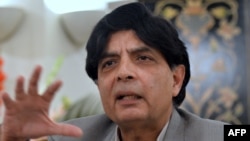ISLAMABAD —
Pakistan’s interior minister presented the government’s new internal security strategy on Wednesday, calling for a national consensus on tackling the lethal Taliban insurgency.
Interior Minister Chaudhry Nisar Ali Khan told lawmakers Wednesday the government’s policy was intended to end the growing terrorism threat in Pakistan.
He said, "if any terrorist action happens anywhere in Pakistan, we will retaliate on the militant headquarters, against those who planned it or carried it out, as we have done in the past week."
The interior minister’s speech Wednesday came after attempts at peace talks with the Taliban collapsed in the face of repeated militant attacks against Pakistan’s security forces.
Pakistan’s powerful military responded with five days of airstrikes against militant strongholds in the country’s northwest.
Ali Khan said there were three options to deal with the terrorist threat: peace talks with the Taliban, a full military operation, or a combination of dialogue and military strikes.
Opposition lawmaker Amir Haider Hoti said he was disappointed by the vagueness of the government’s draft policy.
“Basically, today we were expecting that the government will make an announcement and it will give a very clear picture whether the dialogue is to continue or whether they are going to be acting on some other options. Unfortunately, there was no word on this particular issue, so that has created a lot of confusion,” he said.
But Pakistani lawmakers are divided on how to deal with the brutal insurgency. Some advocate stronger military action.
Others, like Abdul Qadir Baloch, the federal minister for states and frontier regions, insisted dialogue could work.
“So far there is no requirement for launching a full fledged military operation against the Taliban. We are still in the dialogue process and we are hoping that something will come out of it,” said Baloch.
The government’s draft strategy also includes better coordination between the country’s numerous intelligence agencies and the creation of a rapid response unit.
Lawmakers will now debate the policy document.
Interior Minister Chaudhry Nisar Ali Khan told lawmakers Wednesday the government’s policy was intended to end the growing terrorism threat in Pakistan.
He said, "if any terrorist action happens anywhere in Pakistan, we will retaliate on the militant headquarters, against those who planned it or carried it out, as we have done in the past week."
The interior minister’s speech Wednesday came after attempts at peace talks with the Taliban collapsed in the face of repeated militant attacks against Pakistan’s security forces.
Pakistan’s powerful military responded with five days of airstrikes against militant strongholds in the country’s northwest.
Ali Khan said there were three options to deal with the terrorist threat: peace talks with the Taliban, a full military operation, or a combination of dialogue and military strikes.
Opposition lawmaker Amir Haider Hoti said he was disappointed by the vagueness of the government’s draft policy.
“Basically, today we were expecting that the government will make an announcement and it will give a very clear picture whether the dialogue is to continue or whether they are going to be acting on some other options. Unfortunately, there was no word on this particular issue, so that has created a lot of confusion,” he said.
But Pakistani lawmakers are divided on how to deal with the brutal insurgency. Some advocate stronger military action.
Others, like Abdul Qadir Baloch, the federal minister for states and frontier regions, insisted dialogue could work.
“So far there is no requirement for launching a full fledged military operation against the Taliban. We are still in the dialogue process and we are hoping that something will come out of it,” said Baloch.
The government’s draft strategy also includes better coordination between the country’s numerous intelligence agencies and the creation of a rapid response unit.
Lawmakers will now debate the policy document.





